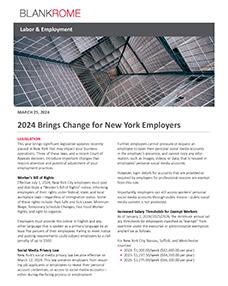2024 Brings Change for New York Employers
LEGISLATION
This year brings significant legislative updates recently passed in New York that may impact your business operations. Three of these laws, and a recent Court of Appeals decision, introduce important changes that require attention and potential adjustment of your employment practices.
Worker’s Bill of Rights
Effective July 1, 2024, New York City employers must post and distribute a “Worker’s Bill of Rights” notice, informing employees of their rights under federal, state, and local workplace laws—regardless of immigration status. Some of these rights include: Paid Safe and Sick Leave, Minimum Wage, Temporary Schedule Changes, Fast Food Worker Rights, and right to organize.
Employers must provide this notice in English and any other language that is spoken as a primary language by at least five percent of their employees. Failing to meet notice and posting requirements could subject employers to a civil penalty of up to $500.
Social Media Privacy Law
New York’s social media privacy law became effective on March 12, 2024. This law prevents employers from requiring job applicants or employees to reveal their personal account credentials, or access to social media accounts—either during the hiring process or employment.
Further, employers cannot pressure or request an employee to open their personal social media accounts in the employer’s presence, and cannot copy any information, such as images, videos, or data, that is housed in employees’ personal social media accounts.
However, login details for accounts that are provided or required by employers for professional reasons are exempt from this rule.
Importantly, employers can still access workers’ personal social media accounts through public means—public social media content is not protected.
Increased Salary Thresholds for Exempt Workers
As of January 1, 2024/2025/2026, the minimum annual salary thresholds for employees classified as “exempt” from overtime under the executive or administrative exemption are/will be as follows:
For New York City, Nassau, Suffolk, and Westchester counties:
- 2024: $1,200.00/week ($62,400.00 per year)
- 2025: $1,237.50/week ($64,350.00 per year)
- 2026: $1,275.00/week ($66,300.00 per year)
For the rest of New York:
- 2024: $1,124.20/week ($58,458.40 per year)
- 2025: $1,161.65/week ($60,405.80 per year)
- 2026: $1,199.10/week ($62,353.20 per year)
In addition, beginning March 13, 2024, employees in New York State must be paid at least $1,300 per week ($67,600 per year) to be exempt under Article 6 of the New York Labor Law, which imposes several requirements on employers, including requirements to: (1) pay clerical or other non-manual workers no less frequently than semi-monthly; (2) obtain employees’ advance written consent before paying wages by direct deposit; and (3) provide benefits or wage supplements within 30 days after they become due.
These requirements do not apply to employees who both: (1) satisfy the applicable duties test for a bona fide executive, administrative, or professional capacity, and (2) meet the salary threshold.
The Freelance Isn’t Free Act (“FIFA”)
The Freelance Isn’t Free Act (“FIFA”) goes into effect in New York State on May 20, 2024, and imposes contract, payment, recordkeeping, and anti-discrimination requirements on companies that hire freelancers. This Act is closely aligned with the existing New York City Freelance Isn’t Free Act, which was implemented in New York City in 2017.
Some key provisions of the Act include:
- Contract: A written agreement is required between an employer and a freelance worker where either: (1) the value of the contract is more than $800; or (2) the worker provides services on multiple projects in a 120-day period that exceed $800 in the aggregate.
- Recordkeeping: Contracts with freelance workers must be maintained for a minimum of six years.
- Penalties: A hiring party who fails to pay a freelance worker appropriately may be liable for damages equal to double the amount owed, along with attorney’s fees.
- Anti-Discrimination/Retaliation: Hiring parties cannot “threaten, intimidate, discipline, harass or deny a work opportunity to, or discriminate against” any freelance worker, and cannot take any other action that penalizes or reasonably deters the worker from exercising any right guaranteed under the Act.
Who Does It Affect?
A freelance worker under the Act is defined as any individual or organization that is contracted as an independent contractor for services worth $800 or more, individually or cumulatively, over 120 days.
COURTS EXPAND LIABILITY FOR EMPLOYERS
Syeed v. Bloomberg L.P.—Why Out-of-State Applicants Can Now Sue for Discrimination
On Thursday March 14, 2024, the New York Court of Appeals unanimously ruled that an out-of-state applicant seeking employment in New York is covered by New York’s anti-discrimination laws. The plaintiff, a resident of Washington, D.C., sought and was denied employment with Bloomberg in its New York office and claimed the denial was due to her sex and race. Although she did not live or work in New York, the Court of Appeals decided that she was protected from discrimination under New York law.
Employers in New York should be aware that as an effect of this ruling, nonresidents who were denied employment in the state can now bring claims under New York City and State anti-discrimination laws.
Blank Rome recommends that your policies and procedures, including your Employee Handbook, be updated to conform with these recently enacted laws and upcoming legislative changes. Blank Rome will continue to monitor New York’s expanding employment laws and their effects.
For more information or assistance, contact Mara B. Levin or Anthony A. Mingione, partners in Blank Rome’s Labor & Employment practice group.


